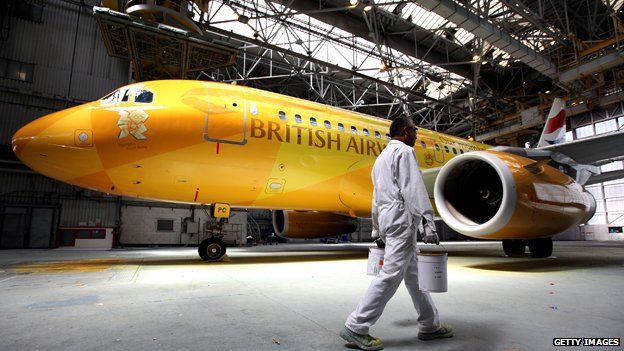Olympic torch: Top pilot's 'most precious cargo'
- Published

The plane carrying the Olympic flame has arrived in the UK. Before it left Greece, we spoke to pilot Captain David Thomas as he prepared for one of the most important flights of his career.
When pilot Captain David Thomas takes off from Athens El. Venizelos airport on Friday 18 May, on board his gold-painted plane will be a highly precious cargo.
Strapped into seats 1A and 1B, in what would normally be business class, will be the Olympic flame as it makes its journey from Greece to the UK.
Its arrival heralds the start of a 70-day relay around the UK ahead of the 2012 Olympic Games in London.
On board the British Airways plane, named The Firefly, will also be a party of dignitaries including footballer David Beckham, Princess Anne and London 2012 chairman Seb Coe.
At the controls of flight 2012 from Athens International Airport to the Royal Navy airbase at Culdrose in Cornwall, Mr Thomas knows the eyes of the world will be on him and his team.
"You try to forget about a lot of the external pressure as it's not helpful, when you're flying passengers you are thinking about safety," he told the BBC.
"I've been in that position before, you don't want to get it wrong but I have got a couple of great guys with me.
"The worst thing for me is I know how good the [TV] cameras are so I'll have to watch what I'm doing at all times."
Nothing has been left to chance in planning for the flight as Mr Thomas, 45, said: "It's slightly unusual to be playing with fire on an aeroplane."
Fire warden
Classed as dangerous goods, there is a specific regulation for the carriage of the Olympic flame.
The UK Civil Aviation Authority has approved a detailed safety case drawn up by Mr Thomas and BA's Dangerous Goods team.
The flame is in four lanterns which sit in two specially-made metal cradles secured to the chair by a seatbelt and a Velcro strap.
In seat 1C will be the fire warden - a Metropolitan Police officer trained in firefighting - who will monitor the flame for the duration of the 1,500-mile flight.
Unusually, and reflecting the significance of the flight, Mr Thomas will be joined by two pilots - a captain and a first officer - whom he selected.
"We're taking an extra pilot which helps with the distractions and if one of you goes sick. It also allows you to delegate responsibilities which is helpful in these situations."
During his career, Mr Thomas has flown the Queen on two royal tours and former prime minister Tony Blair to a G8 summit in Germany, so has few nerves about high-profile flights.
"With any VIP flight there are added distractions and you need to focus on keeping everyone safe.
"Once you land and turn the engine off then you can start to enjoy yourself."
The plane was scheduled to leave Athens at about 17:00 (15:00 BST) and the journey should take just under four hours.
As head of flight training at British Airways, where he has clocked up almost 20 years of service, Mr Thomas said his selection for the role was something of a given among colleagues.
"Everyone assumed it would be me," he said. "Maybe they thought it would be good to get me out of the office."
And despite telling his two children - aged 10 and 12 - the news several months ago, they managed to keep it under wraps.
Rehearsal flight
"I told my kids, and told them it was a secret and they couldn't tell anyone up until about a month ago when we did the trial flight to Culdrose and they managed it.
"It is fantastic. It's a once-in-a-lifetime for me. There's lots of history, being involved in the Olympic movement which goes back thousands of years.
"In terms of symbolism this is the most precious cargo I have carried and it's a new story for me to tell at dinner parties."
As part of the planning, an airport code - CDR - had to be created for Culdrose as it is a military base and did not exist in the computer database that sets the course of a flight.
Mr Thomas also carried out a rehearsal flight from Heathrow to Culdrose in March in which one - unlit - lamp was taken in the cradle and strapped in as it would be on the Athens flight.
The pilot said it was "good to have a dry run" as at Culdrose pilots have to be talked down by the controller instead of using radio signals to guide the aircraft.
"It was also a different size and speed of aircraft than they are used to so was good for them to have a run-through," he said.
The turning circle was also tested out as they checked out the best place to park the plane at a safe distance from where the cauldron will sit.
But despite planning for every eventuality, with a week to go until the flight Mr Thomas admitted leaving what he would say to the dignitaries on board after landing until the last minute.
"I haven't prepared anything but I will give it some thought as you have to do something a bit different," he said.
- Published10 May 2012
- Published18 May 2011
- Published9 May 2012
- Published1 February 2012